HNS, Hrvatski Telekom, and SuperSport Sign Historic Croatian Football Contract
May 4, 2022 - A historic Croatian football contract was signed today by the Croatian Football Federation, Hrvatski Telekom, and SuperSport.
Today in Zagreb, the leaders of the Croatian Football Federation, Hrvatski Telekom, and SuperSport signed an agreement on television and marketing rights for matches under the auspices of the Croatian Football Federation, announced HNS.
The contract signing ceremony by which Hrvatski Telekom became the owner of television and SuperSport marketing rights for matches owned by the Croatian Football Federation was organized in the Opera Hall of the Westin Hotel in Zagreb. Contracts run from the beginning of the 2022/23 competition year until the end of the 2025/26 competition year.
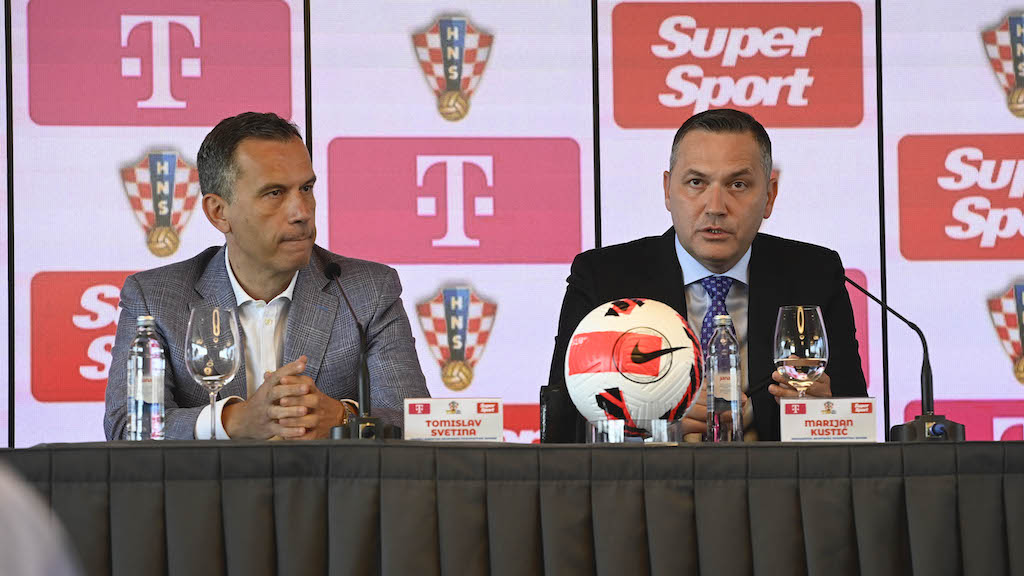
HNS
It is the most valuable agreement for television and marketing rights in the history of domestic club football. During the four contracted years, Hrvatski Telekom will invest EUR 36 million for television rights, while SuperSport will invest a total of EUR 8 million for marketing and betting rights. The Croatian Football Federation has thus provided 44 million euros in four years for domestic football.
"I thank the present management of Hrvatski Telekom and SuperSport for their trust and the respect they have shown for such a significant investment in domestic football. We are especially pleased to sign such vital contracts with companies that are proven friends and partners of Croatian football, which gives us additional faith that together, we will make our First League but also other competitions even stronger, more attractive, and better.
It is unnecessary to emphasize how much these funds will mean for our first leagues and other clubs in Croatia - this is the most crucial contract related to domestic club football in history and confirms its market value. I am sure that this value will continue to grow thanks to this agreement and that this significant investment will pay off for our partners as well," said HNS President Marijan Kustić.
"I am delighted to continue our long-term cooperation with HNS. We always strive to provide our customers with the best sports content, and Croatian football falls into that category because it is about content close to the fans of all Croatian clubs. With our renewed four-year partnership with HNS, we are laying the foundations for the further development of Croatian football clubs, to enjoy even more competitive competition and better matches in production and on the leading pay-TV platform in Croatia," said the President of the Management Board of Hrvatski Telekom Kostas Nebis, while the member of the Management Board Nataša Rapaić added:
"Croatia is a sports nation in which football has a special status and significance, and the Croatian Football League has never been so interesting. We are pleased that HT can convey this excitement and positive emotions to the Croatian audience. We stand for these values as a company - connectivity, positivity, and creating new opportunities."
SuperSport has become the owner of marketing and betting rights, and satisfaction with the signed contract was expressed by a member of the SuperSport Management Board, Goran Đurić:
"We are proud that SuperSport has become a direct partner of Croatian football, in which we have invested significantly before. I believe we all agree that our football league has never been more interesting, and we are convinced that this agreement will allow further development of clubs and domestic competitions. We trust HNS, and we are looking forward to working with the Federation and Hrvatski Telekom on the further marketing, commercial, and media development of domestic football."
"Football is the most popular, important, and most-watched sport in Croatia. The First League is equally watched and important to both spectators and our players as the strongest football competitions in the world, such as the Champions League. That is why we are thrilled that today we signed such a valuable contract that will enable our football to continue to grow, which is visible by all criteria. We are proud to provide our players with the highest quality content as market leaders," added SuperSport Board Member Radim Haluza.
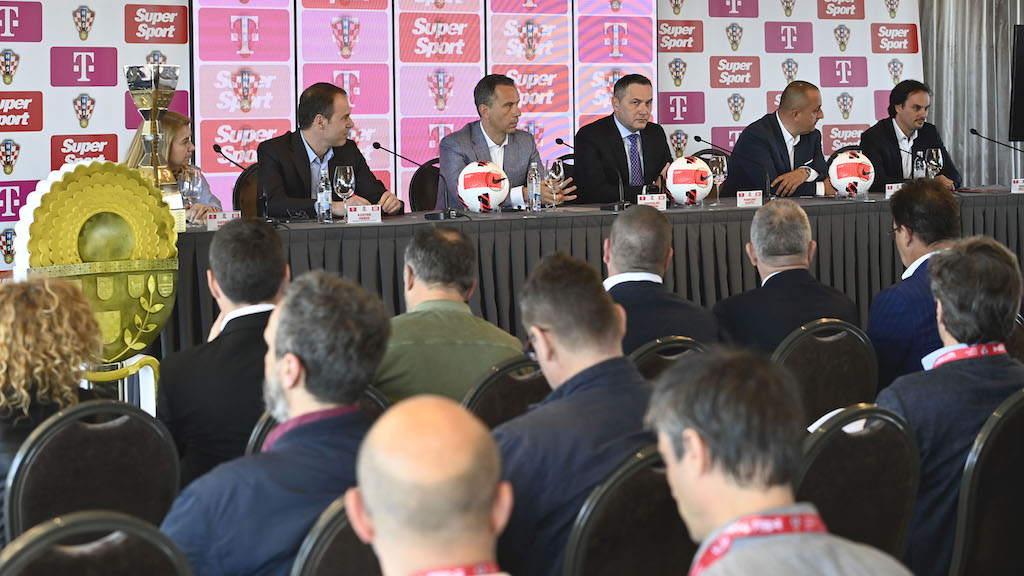
HNS
"For HNS, and especially Croatian clubs, the contract we signed today is truly of historical importance. I want to thank our partners, Hrvatski Telekom and SuperSport, for their trust and congratulate all clubs that have raised the level of quality and the curiosity of the competition to the level that we can sign a contract like this. An important role in increasing the league's attractiveness was played by HNS's first league turf project, which shows that for all of us - clubs, federations, and local communities - further development of stadium infrastructure should be a strategic determinant so that the value of our 'product' continues to grow," HNS Executive Director Tomislav Svetina emphasized.
After signing the contract, the leaders of HNS handed over one home and one reserve jersey of the 2018 World Cup finalists to the leaders of Hrvatski Telekom and SuperSport with the numbers 2022 and 2026, which together show the duration of the contract signed today.
To read more about sports in Croatia, follow TCN’s dedicated page.
HT And Nokia Test 25G PON Broadband Optical Network
ZAGREB, 10 March 2022 - Hrvatski Telekom (HT) and Nokia on Thursday tested in Rijeka Nokia's 25G PON broadband optical network, a new generation of optical networks that significantly enhances the speed of data transfer, HT said.
The first national testing of Nokia's network was performed in HT's Rijeka laboratory, as part of which high speeds were achieved, of 20 gigabits per second.
"25G PON technology is ten times faster than GPON technology, whereby HT enabled a gigabit broadband connection for the first time in 2007. It is also two and a half times faster than XGS-PON technology that has been in use in HT's network since 2021," the company said, adding that HT's equipment was ready for 25G PON and that adjustments of the main systems to enable its commercial availability were not necessary.
The commercial use of the technology will be possible once user services for the network are developed.
HT says the biggest advantage of the 25G PON optical network is its high capacity, cost optimization, broader use, and simple introduction in HT's existing optical network.
HT expects the new optical network to facilitate the development and introduction of advanced, high-performance solutions such as big data, artificial intelligence, and machine learning, 5G transport via PON, and ultra-high capacity wholesale services.
For more, check out our business section
HT Posts HRK 614M In Net Profit in 2021
ZAGREB, 24 Feb 2022 - Hrvatski Telekom (HT) generated a net profit of HRK 614.4 million in 2021, which is 7.1% more than in 2020, the telecommunications company reported on Thursday.
According to the information published on the Zagreb Stock Exchange, HT ended the year with total revenue of HRK 7.5 billion, which is one percent less than in 2020 while the HT Group's "organic revenue" in 2021 registered an increase of 1.1% on the year.
Total consolidated net revenue decreased by HRK 64 million or 0.9% y-o-y with the group's revenue decreasing by 1.1% while Crnogorski Telekom in Montenegro registered an increase of 2.5%.
Total expenditure was decreased by 1.4% on the year and amounted to HRK 6.7 billion.
"Organic EBITDA after loans increased 7.9% on the year which is an increase of EBITDA after loans for the fifth quarter in a row and confirms the continuation of strong positive business development and effects of transformation measures."
In the past five years, investments amounted to HRK 9 billion, making HT the biggest investor. Capital investments in 2021 were more than HRK 1.7 billion, which is more than the 1.6 billion planned.
Last year HT paid HRK 742 million in dividends to its shareholders, the company told Hina.
For more, check out our business section.
HNS Secures EUR 44 million for Croatian Football TV and Media Rights Over Next 4 Years
February 22, 2022 - The Croatian Football Federation has secured 44 million euros for Croatian football TV and media rights over the next four competition years.
At Monday's session, the Croatian Football Federation Executive Board decided on selecting partners for television and media rights for competitions under the auspices of HNS for the next four competition years, reports the HNS website.
After terminating the contract with Endorphin Magine, the HNS management held meetings with companies interested in buying TV and media rights, followed by three official offers to purchase TV rights - A1 Croatia, Hrvatski Telekom, Sportklub and AB SportConsulting. At the same time, the SuperSport offer for media rights arrived.
At the session, the HNS Executive Board considered the three received offers and chose Hrvatski Telekom, which was the most generous of 9 million euros per year. Thus, in the four years that the contract is expected to last, Hrvatski Telekom will pay 36 million euros to HNS for the associated TV rights.
In addition, the SuperSport offer for media rights of 1.5 million euros per competition year for sponsorship rights and 500,000 euros per competition year for betting rights was accepted.
In total, HNS has secured 44 million euros for television and media rights over the next four years.
"As we announced last week, we quickly found the best solution for Croatian clubs and Croatian football as a whole. Negotiations with interested companies showed great interest in Croatian club football and accepted offers from HT and SuperSport best confirm this great value.
We are glad to continue our cooperation with Hrvatski Telekom, which has been a great partner of Croatian football for many years, so we do not doubt that this cooperation will be very successful. This is an unprecedented step forward for the Federation and our clubs, and I am convinced that these 44 million euros will ensure further progress in the First League and all other competitions," said HNS President Marijan Kustić.
An agreement has also been made between Hrvatski Telekom and HRT, according to which one match of each round will be broadcast on national television.
To read more about sport in Croatia, follow TCN’s dedicated page.
Hrvatski Telekom Presents Capabilities of 5G+ Network
ZAGREB, 21 Oct 2021 - The Hrvatski Telekom (HT), a leading telecom in Croatia, on Thursday presented capabilities of the 5G+ network, which provides a speed of 4 Gbit/s and network response times of only ten milliseconds.
However, its commercial use in Croatia is not going to be possible for yet another year or two due to the lack of adequate devices and telephones.
"5G+ network is based on 26 GHz frequencies and will cover areas that require the best network performance, and will provide 4 to 8 times higher capacity in areas with the highest requirements for the use of data services," the company says on its website.
HT noted that 5G+ was only just emerging in Europe and that Croatia was among the first countries where it is being developed while a member of the Management Board of Hrvatski Telekom and CTIO, Boris Drilo, underscored that that technology already has been existing in America for several years now, adding that smart telephones for that technology exist only in Korea.
Recalling that HT had purchased a frequency spectrum for 5G, Drilo explained that currently, 5G operates on the spectra of 700 Mhz and 3.6 GHz, whereas 5G+ is implemented on a spectrum of 26 GHz.
"With 5G+ network performances we have shown today, we have demonstrated the exciting future we have with 5G technology. The e-mobility and EV segment is just one of the branches that will experience a full boom thanks to 5G. Due to the large spectrum width, the 26 GHz frequency band will be crucial in the future for achieving high capacities as well as high peak transmission speeds. This will enable the development of new customer services that will be able to use high capacity and ultra-low latency, such as, for example, campus networks for Industry 4.0," Drilo was quoted as saying.
He underscored that the current technology will be faster and more reliable which is important for many segments in transport, electric vehicles, and filling stations.
That means faster and better connections for electric vehicles, smart traffic lights, parking, and e-filling stations of which there are currently 600 in Croatia, the head of HT's e-mobility project Dina Novosel said. Half of those stations are managed by HT, and with regard to the current amount of 2,000 electric vehicles, that is sufficient for the time being but it will have to be increased given the trends in the automobile industry.
5G however will not immediately accelerate and resolve everything and that will take some time.
According to HT, currently, there are about 100,000 5G phones in use in its network in Croatia.
For more, make sure to check out our dedicated lifestyle section.
Croatian Telecom Puts First Dubrovnik 5G Network into Function
August the 13th, 2021 - As has unofficially been learned, the very first Dubrovnik 5G network has been set up and put into function by Croatian Telecom, bringing Croatia's southernmost city in line with the most advanced of Internet speeds.
As Dubrovacki Dnevnik writes, according to unofficial information available to the previously linked Dubrovnik daily, the first Dubrovnik 5G network was launched in four locations - in the Gruz business zone, on Ilijina Glavica, around the Rixos Libertas hotel and in Mokosica. The Dubrovnik daily tested out the new 5G network that allows for a huge speed of almost 1000 mbps in two of those locations - Ilijina Glavica and at the Rixos Libertas hotel. Of course, a prerequisite for use is the possession of a device or mobile phone that supports 5G.
The first Dubrovnik 5G network represents huge opportunities for Dubrovnik's local economy and perspective.
The fact that Croatian Telecom was the first to launch the Dubrovnik 5G network also shows that it is an infrastructural precondition for the development of the area of Dubrovnik in the direction of a smart city, which is often mentioned in the city as one of its priority goals. Of course, this is an opportunity for the further development of sustainable tourism, especially in the perspective of digital nomadism and the city's commitment to be a centre of digital nomad tourism. In addition to all of the above, this step also represents a kind of path towards the further improvement of Dubrovnik's local economy and the opening up of opportunities for the development of the IT sector in Dubrovnik.
It should be noted that after the public auction procedure and the investment of 130 million kuna for the new radio frequency spectrum, Croatian Telecom was assigned a 2x10 MHz block at the national level in the 700 MHz frequency band, 12 10 MHz blocks in the 3.6 GHz frequency band (total 120 MHz), and in the 26 GHz frequency band, 2 blocks of 200 MHz (400 MHz in total). Licenses for the use of radio frequency spectrum are granted for a period of fifteen years.
The new 5G network means higher speeds for half a million inhabitants, including the people of Dubrovnik.
Croatian Telecom recently announced that it now provides coverage of two million inhabitants through 600 5G base stations. At the same time, as many as 149 or every fourth base station operates at 3.6 GHz, which means that they are in the area of 12 cities; in Zagreb, Split, Rijeka, Osijek, Dubrovnik, Karlovac, Pula, Slavonski Brod, Sibenik, Varazdin, Velika Gorica and Zadar, and even higher speeds were provided for half a million inhabitants.
Ensuring the largest share of the 5G spectrum, Croatian Telecom's network is ready for all of the future requirements in terms of capacity, high speed and low latency, both in the private user and industrial segment. It will enable the use of the 5G network on all three frequency bands: 700 MHz, 3.6 GHz and 26 GHz, thus continuing to set industry standards and enable the application of new technologies with the aim of stimulating economic growth and social progress. Healthcare, education, manufacturing, agriculture, energy, tourism, transport, smart city development and Industry 4.0 are just some of the areas that the implementation of the 5G network will significantly improve.
To all of its customers, in certain tariffs in the period until September the 30th, 2021, Croatian Telecom will offer (without any additional costs) the possibility of using the 5G network for which it is necessary to be in the area of 5G network coverage and have a compatible 5G device. According to the plan, enabling the use of the 5G network on new frequencies has already begun and is being implemented gradually through tariffs. It is envisaged that the benefits of the new frequencies during August will become available to all users who were involved in the promo period of using 5G via DSS technology.
For more, follow our lifestyle section.
Road Testing the Croatian Telecom 'Digital Nomad' Surfing Package
July 8, 2021 - Getting online in a new country can be a hassle. TCN road tests a new product from Hrvatski Telekom - the digital nomad surfing package.
I don't get asked to review topics very often, and on the rare occasions that I do, it is usually a product I have some experience in.
After reporting so heavily on the digital nomad subject over the last couple of years, Hrvatski Telekom invited me to road test their digital nomad surfing package, under the inviting title of Relax or Work with No Limits in Croatia. I felt the chilled breeze of the Adriatic already.
While glad to accept and help out, the thing is that while I may write a lot about digital nomads and IT startups, I am actually the least technical person in Croatia. So if I could figure out this surfing package, then it really was idiot-proof.
The last time I opened a phone to insert a SIM-card, for example, was over a decade ago, thanks to the tech-savvy ladies in my family. Thinking about it, where was the SIM-card in my Samsung Galaxy?

I started at the recommended place, the dedicated Visiting Croatia page on the Hrvatski Telekom website. Clean simple messages. 7 days of FLAT mobile data, Max 4G speed on the leading mobile network in Croatia, and a 3-in-1 Multi SIM card which fit all devices. So far, so good.
With promised speeds of up to 600 Mbit, no contracts whatsoever, and just a simple payment to get started, this certainly had the feel of a quality product that could soon become my new best friend.
You get started with 85 kuna for 7 days (11 euro), which gets you 7 days of unlimited data at 4G speed, including a 5 kuna credit in the phone (useful for me when I called home, without realising I had switched SIM cards).
Each subsequent week costs 60 kuna, so if you know you are going to be using the service for 2 weeks, simply pay 145 kuna in advance, and your bureaucratic woes are over. Pay by credit card or cash on delivery to the address you state.
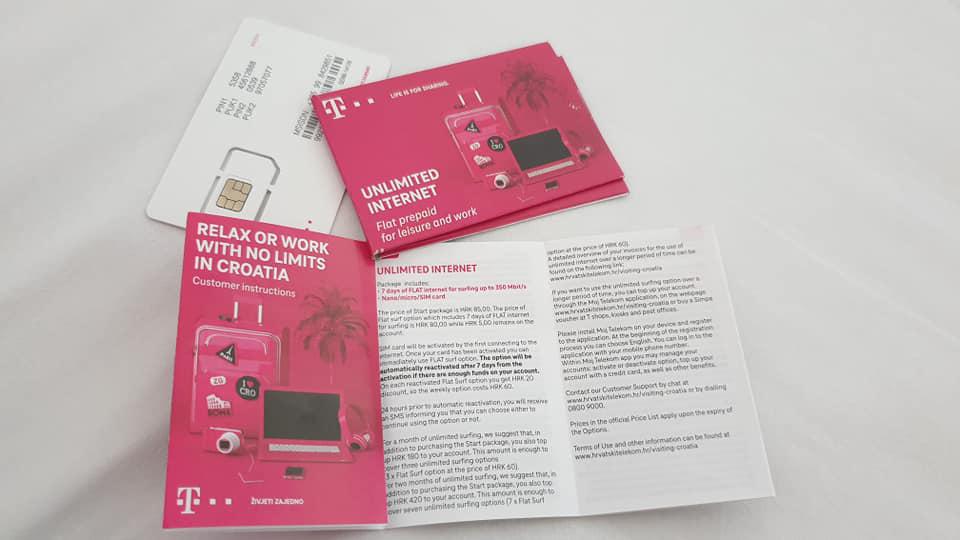
My package arrived the next day, with sleek-looking contents. A SIM-card and some multi-lingual instructions on how to get started. There are two things you basically need to know – the Visiting Croatia page was the go to for information and questions, and the Moj Telekom application was necessary to download.
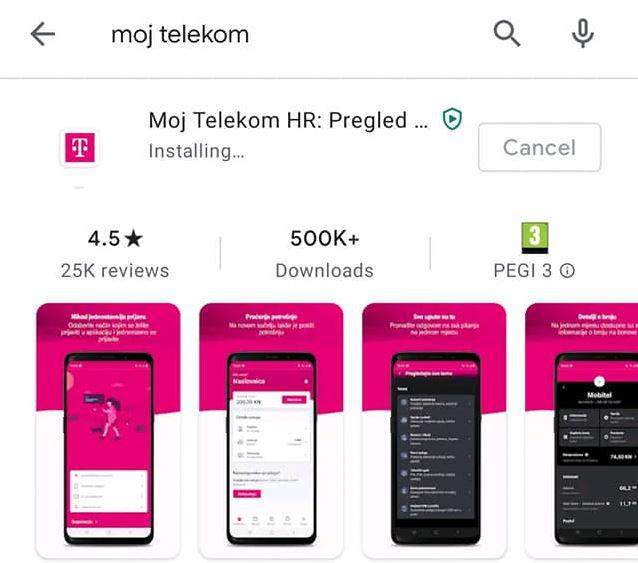
That didn't take long, but then came my first technical challenge. 99% (or maybe 99.99%) of phone users can skip this part, as it merely reflects my own incompetence. Where exactly was the SIM-card in my phone?
Having been shown all by the long-suffering ladies of the household, I was delighted to see I had space for two SIM-cards, and inserted my new friend and restarted the phone. Having downloaded the application, I was guided to enter my phone number, which I dutifully did (my actual phone number, not the one from the SIM-card). There was an error.
As it was a Sunday afternoon, I saw that this was an opportunity to further road test the Hrvatski Telekom system. A shiny new website was all very well, but would customer service actually work on a Sunday afternoon?
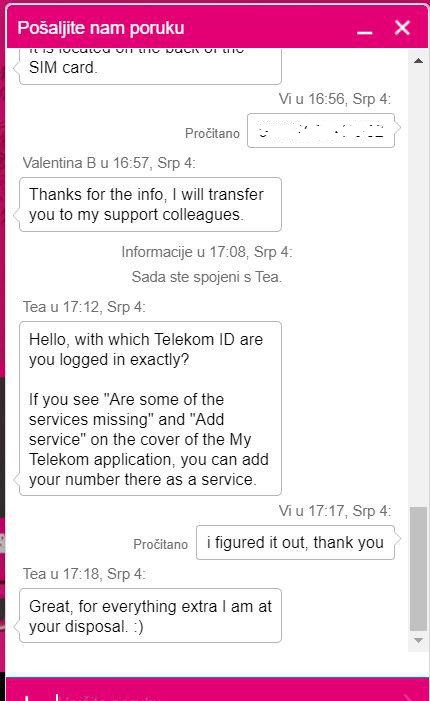
Indeed they did, and I had to wait less than 30 seconds for them to start dealing with my issue. Impressive for a Sunday afternoon. It was only when I was trying to explain in detail what my issue was that I noticed a phone number on the card with the SIM-card that I had inserted. No wonder they were having problems understanding what I was talking about.
As I said, some 99.9% of phone users are not as backward as me, so let's move on to the next step, which is to enter the phone number.
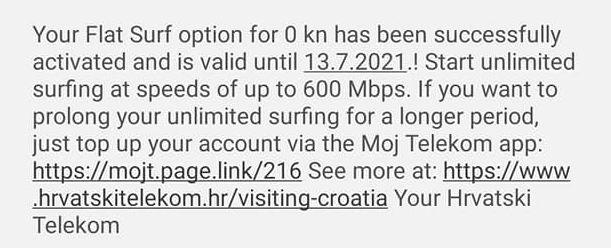
And with that, an SMS and I was free to go. Two useful links to the application and the Visiting Croatia page.
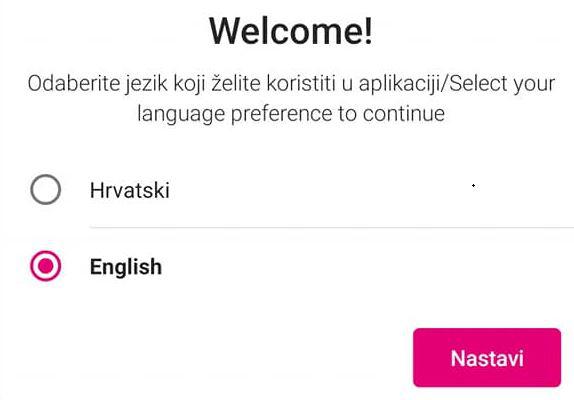
The application was friendly enough, directing me to an English-language option immediately.
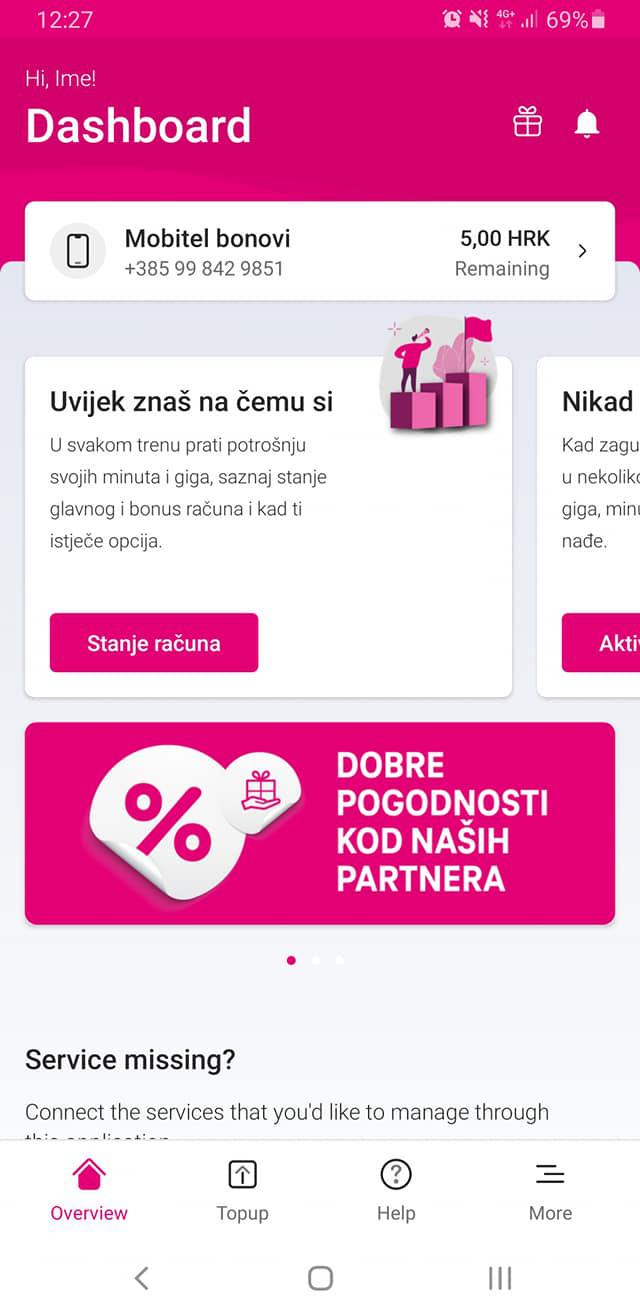
One suggestion for the application dashboard, perhaps, it to try and make it 100% English, for a better user experience. Having checked with Hrvatski Telekom later about this, they informed mw that they plan to make application 100% in English very soon.
So now that I was finally connected, what about the most important thing of all – speed?
I live in a relative Internet black spot near Varazdin, and I am always envious of the speed in the town itself. I was pleased to see Relax or Work outperforming my current Internet provider, but I was really interested to see what would happen when I hit Zagreb.
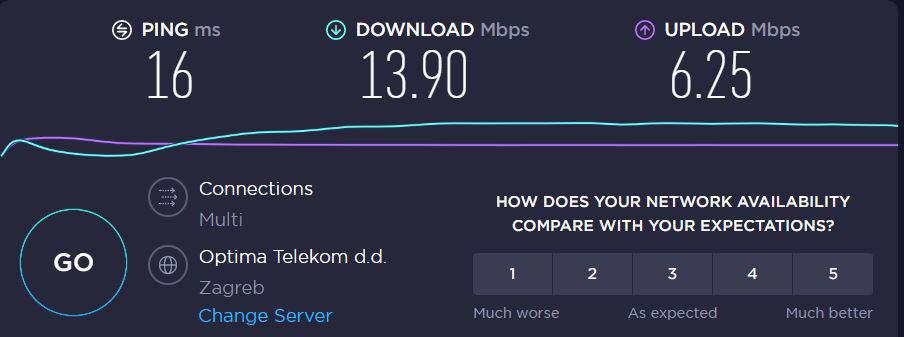
I connected to the guesthouse WiFi with my laptop, with the results above. Not that inspiring, and not that much better than at home.
And then I checked out the same test on my phone.
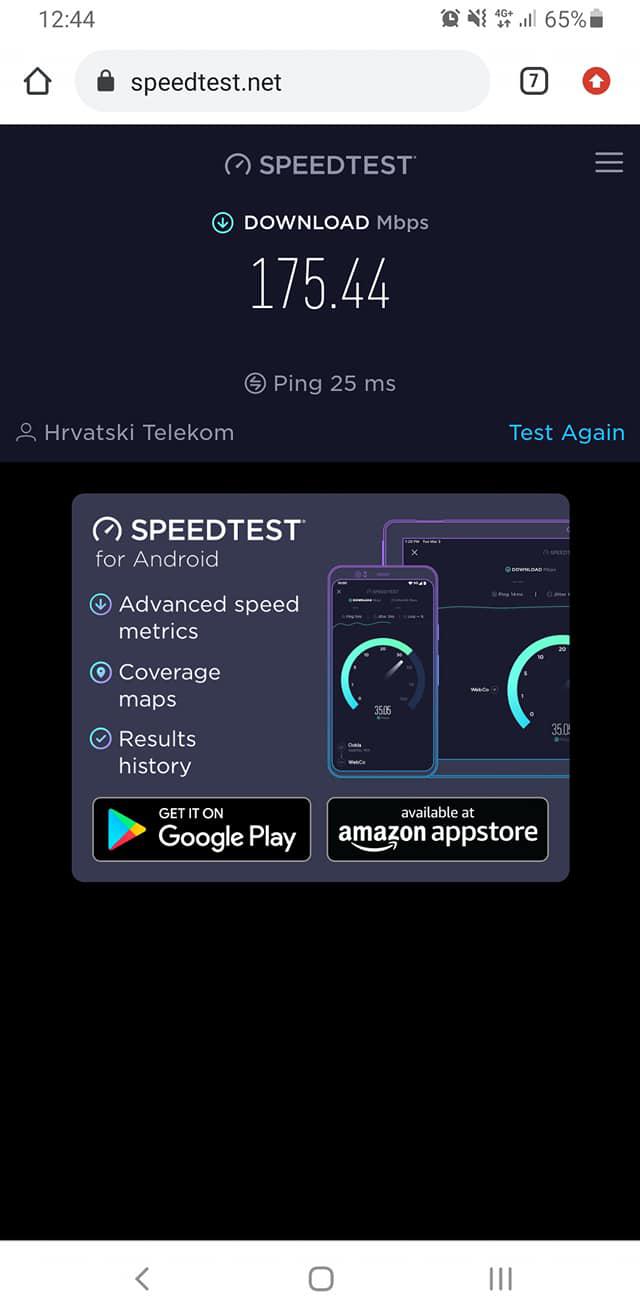
Now THAT is an Internet speed worth getting excited about.
A very useful service that Hrvatski Telekom offers is an Internet speed map of Croatia for their network. You can check by individual address, and it is a VERY useful tool when choosing accommodation. I tried the service in several locations against the local service, and it outperformed the normal provider each time.
I made a phone call, sent a text, and sent an international text – all without problems.
In fact, the only problem in the whole seamless process (apart from perhaps a little translation in the application) was me. But if even I could figure it out, then it really must be a breeze for the rest of the world.
I travel a lot in the Balkans, especially to Montenegro and Albania. Each time, as I leave the EU, I am left with a dilemma. Do I accept I will have higher charges due to being abroad, or do I try and find a local solution? For years, the whole inconvenience of trying to sort this out has kept me paying the more expensive option.
But perhaps no longer. Relax or Work with No Limits in Croatia has been a revelation to me. Not only do I now know where to locate my SIM-card in a phone I have had for years, but it has also shown me that international surfing can really be a stress-free experience with the right product.
So big thumbs up from me on this new service which is bound to be a hit with digital nomads and tourists alike. A one-time payment with no contract, a user-friendly website and application, and excellent Internet speeds. And let's not forget that very useful map when choosing your accommodation.
And if a technophobe like me can make it work, imagine how user-friendly this must be to someone more competent.
This post was done in cooperation with Hrvatski Telekom.
Unlimited Internet for Digital Nomads with Hrvatski Telekom!
April 20, 2021 - Now you can work from any location in Croatia, as unlimited internet for digital nomads with Hrvatski Telekom is now available!
One of the great benefits that technology provides is that today we do not necessarily have to be tied to a desk, office, or even a country to do the job. A laptop, tablet, or smartphone, and a reliable internet connection make it possible to work anywhere in the world, and Croatia is an excellent choice.
To support the fast-growing community of digital nomads and provide them with quality working conditions, Hrvatski Telekom has prepared an ‘Unlimited Internet’ bundle that is simple to activate. All digital nomads need is to ask for this bundle on the website and it will arrive at their chosen address. This allows the user to easily top up and use the card for a longer stay in Croatia.
The ease of use and the fact that no contractual obligation is required make the ‘Unlimited Internet’ bundle ideal for all digital nomads living life on the move. It can be activated first for one week at the price of 85 kunas. This weekly offer includes seven days of unlimited surfing. The SIM card is activated when you first connect to the internet, and immediately after activation, you can use the unlimited surfing option. For each further reactivated Flat Surf option, users get a 20 kuna discount, so that the price of this option is 60 kunas per week. The maximum single top-up is HRK 2,000, which is enough to cover slightly more than eight months.
The estimation is that there are 4.8 million people in the world who have in some way opted for a digital-nomadic lifestyle, with as many as 17 million people aspiring to it. Having in mind the characteristics of such a lifestyle, mobility, flexibility, creating your own schedule, and choosing the location of work, Hrvatski Telekom wants to provide digital nomads with a fast and stable internet connection at any time and in any place, which is crucial for their work.
“We listen to the market and the needs of our users every day. With the ‘Unlimited Internet’ bundle, we wanted to make work easier for digital nomads who are already in Croatia and for those who consider Croatia as a destination from which to work to show that one of the ten fastest mobile networks in the world makes it not only possible, but also an excellent choice“, said Richard Brešković, Director of Residential Marketing Sector of Hrvatski Telekom.
For the latest digital nomad news from Croatia, follow the dedicated TCN section.
Croatian Telecom 5G Network Offer to Cover Many Croatian Residents
December the 15th, 2020 - Croatian Telecom is only continuing its marked success over recent months as it prepares to offer access to its 5G network for more than one million Croatian residents.
As Novac/Bernard Ivezic writes, after being challenged by competition in mobile communications for a long time, Croatian Telecom (CT) has made a significant and decisive turn this year. The company was the first in all of Croatia to offer 5G commercially, and it already offers it to more than a million citizens across fourteen Croatian cities, then it received recognition from Spetest and Ookla that its 4G network proved to be the 10th fastest mobile network in the world, a result achieved by no other operator from Croatia.
Jutarnji list talked about this with Boris Drilo, a member of CT's board for technology and information technology. Drilo says that he expected a good placement, but that he couldn't have even imagined that CT would be declared the tenth best in the world.
How many 5G users does CT have?
At the moment, there are about 17,000 users with 5G devices on our network. 5G is available to users using certain tariffs until the end of June 2021, without paying a fee. Leading the way are Samsung's models, with a 50 percent share, then iPhone with a 20 percent share, followed by a group of Chinese manufacturers, such as Huawei and Xiaomi.
Why did you rush to offer commercial 5G to Croatian residents for free?
Because it's important to both us and our customers. For us, it's an important technological step forward, a goal in our development path by which we wanted to show ourselves and our partners what we want to achieve. This is important for our users, too, because this year, all the latest mobile phone models supported 5G technology. If you have the best tariffs on our network and the best mobile phones, we want you to have the best user experience, ie the fastest access to mobile Internet and apps.
When 2G, 3G and 4G came out, none of this was discussed, but with the advent of 5G, it was talked about. Is your 5G the real 5G considering that the frequencies for 5G won't be shared until 2021?
CR has been offering 5G commercially, and it is real 5G in terms of how data exchange between mobile phones and base stations works. That's why you have a 5G icon on your phone. Our 5G network works on the frequencies we have now. When we get new frequencies, we'll start using them. In this case it is important to understand that 5G will work on all frequencies, new and old, including those used today for 4G, 3G and 2G technologies.
What enabled you to offer commercial 5G and 5G frequencies before 2021?
When it comes to the rules on the use of the radio frequency spectrum, the regulator Hakom has expanded the definition of technological neutrality of the spectrum we use. So far, that neutrality has applied to 2G, 3G and 4G technologies. 5G technology wasn't included in it because it didn't exist at the time of its writing. This has now been changed by Hakom, which is a common practice all over the world. However, that doesn’t mean we won’t have to go for the allocation of the new 5G spectrum. This is now a transitional solution. The state plans to allocate the 5G frequencies. We hope, given that we believe that it isn't yet time to monetise 5G, that the fees that the state will demand for 5G will be set fairly to enable us to establish the proper infrastructure that will be the basis for digitalisation of the economy and society as soon as possible.
How much faster is surfing over 5G compared to 4G at the moment?
You can currently surf 10 to 15 percent faster on 5G than you can on 4G. This is because they use existing available frequencies, which have so far been used for 4G using a technology called Dynamic Spectrum Sharing, and a limited set of available 5G technology capabilities. The plan with the development of 5G is to reach gigabit speeds. For this, we'll have to wait until 2021, when new frequencies will be allocated, for example those at 3.5 GHz, thanks to which the available spectrum will be doubled and a significant increase in speed will be enabled. Currently, all three operators have an average of 90-100 megahertz of spectrum available, and with the allocation of the new spectrum, each operator will receive an additional 100. In parallel, new technological capabilities will be offered on 5G, so the speeds will reach gigabit. In reality, user speeds on 5G networks at 3.5 GHz will be 2-3 times higher than those we now have on 4G.
What does the increase in surf speeds on 5G depend on?
Firstly, they depend on the allocation of a new spectrum next year and on the technological possibilities of combining the existing and new frequency spectrum. The more spectrum we're able to offer for 5G, the higher the speeds will be. At the same time, it's important that users switch from 4G devices to 5G devices in order to take advantage of all the benefits provided by this new technology.
What speeds can Croatian residents expect in the long run?
With the arrival of a new spectrum and new technological capabilities of 5G and up to ten times higher speeds in the future. Ideally up to a gigabit, potentially a gigabit and a half. However, in reality, and in real conditions, it may not be so. For example, 4G user speeds today stand at around 60-70 Mbps, not 300-400 Mbps as achieved in very favourable conditions. Additionally, 5G won't be 1Gbps for everyone nor will such speeds be available everywhere, around 300 Mbps in real conditions should be achievable, however.
Will 5G reduce the number of network crashes for Croatian residents?
5G technology means an advancement in every way. In some segments, the fifth-generation network architecture will be more distributed than the 4G architecture is, which in theory means it should be more resilient and as such more stable. However, each new technology comes with certain 'childhood diseases' that we'll need to be prepared for and work on.
Will 5G increase radiation?
The way things were for 4G are the same as they'll be with 5G. Croatia has one of the strictest regulations on this issue and that hasn't changed. So, everything that is strictly defined for 4G is equally as strictly defined for 5G. The maximum allowable radiation intensity isn't about to change. Everything is going to remain as it was, that is, we're going to remain more rigorous than many developed European countries such as Italy, France, Austria and Great Britain. Such rigorous rules aren't good because they slow down the development of networks and thus slow down the digitalisation and development of the economy and society.
We can already see that with the arrival of 5G, 3G and 4G networks will disappear, and potentially 2G will as well. Will WiFi networks disappear as well?
No. The fifth generation of mobile networks will remain in the domain of mobile networks while WiFi will continue to be used for home networks and related Internet access within households or for specific needs such as Internet access in hotels or conference rooms. Just as 5G will not replace optical Internet access, it will also not replace WiFi, which as a standard continues to evolve to enable the highest possible wireless speeds within a household connected to the Internet via an optical connection. For example, the latest WiFi 6 standard defines speeds of up to 10 Gbps, which isn't possible if you don't have a very high capacity optical connection.
However, in industrial applications, if anyone has even used WiFi until now, there is a good reason to replace it with 5G. I expect 5G to go in the direction of industrial use in this case, it will involve communication with devices, machines and robots. It's to be expected that industrial 5G modules will be much more affordable, and by its very design, 5G envisions much more industrial application than WIFI.
When we talk about technological possibilities, ie the maturation of 5G technology, what is already possible today, for example, on your 5G network?
We presented the cooperation on the transmission of video signals between drones and augmented reality glasses made by the Croatian startup Orqa via 5G. I expect 5G technology to gradually mature over the next five years. Not all 5G functionalities are there from the very beginning. For example, the 5G functionalities that will enable self-driving cars aren't yet there. This requires latency, ie the response speed of the 5G network below 10 milliseconds. For example, we're now at 25-30 milliseconds in real conditions. I think that before that comes, we'll start with the application of 5G sensors in so-called smart solutions, whether that's agriculture, logistics or the municipal infrastructure of cities. 5G is better than 4G technology, as it allows for a much higher sensor density per square kilometre.
For the latest travel info, bookmark our main travel info article, which is updated daily.
Read the Croatian Travel Update in your language - now available in 24 languages
Croatian Telecom Launches National Digital Education Programme
December the 11th, 2020 - The older generation will get a helping hand when it comes to technological advancements thanks to Croatian Telecom/Hrvatski Telekom, who will launch a national digital education programme intended precisely for them.
As Poslovni Dnevnik writes, under the current and increasingly tiresome anti-epidemic measures, nursing homes were forced to severely restrict visits from family members, friends and volunteers. Thus, social contacts and socialising, which have always played a key role in the daily lives of the residents of nursing homes, were lessened dramatically, replaced by an unfortunate and considerable sense of loneliness and isolation, which is especially difficult as the festive season approaches.
Aware of this problem, Croatian Telecom, in cooperation with the Volunteer Center Zagreb, has launched a national digital education programme designed for the elderly. During the first phase of the national digital education program, which is part of a broader socially responsible "In Good Hands/U Dobrim Rukama" concept, the company donated tablets and free internet for fourteen homes for the elderly throughout Croatia, and next year, the programme will continue to expand in order to include additional such homes.
Members of the Croatian Telecom Volunteer Club also participate in the national digital education programme, and the will prepare easy-to-understand educational videos through which senior citizens will easily be able learn how to use various digital tools that will allow them to be connected and remain in constant contact with their families and friends throughout this difficult time. In the first video, the residents of fourteen homes for the elderly in the City of Zagreb will learn how to establish WhatsApp video calls on their tablets. Educational video materials will be continuously upgraded and will soon be published on the official channels of Croatian Telecom.
"Digital tools are here to make our lives easier. Unfortunately, a large number of our senior citizens don't have enough digital skills to be able to take advantage of them. That's why we see the digital education programme for senior citizens as fulfilling our mission of connecting everyone in Croatia with the possibilities of digitalisation and building a world of better opportunities. We want to teach them how to use digital tools like video calls through which they can hear and see their loved ones much more often. At Croatian Telecom, we're aware of our important role in ensuring equal access to technology for everyone in Croatia, and we aren't going to stop until we achieve this,'' said Ivan Bartulovic, a member of the Human Resources Management Board of CT.
"The digital education project has recognised a very vulnerable group of citizens during the epidemic and the closure of society - residents of homes for the elderly, who, in these unfortunate circumstances, are almost completely cut off from their loved ones. Volunteer Centre Zagreb recognises the value of the project and we look forward to its positive impact on their quality of life,'' said Nina Butic Ivankovic, Executive Director of the Volunteer Centre Zagreb.
We're all aware that nothing can replace contacts and socialising in person, but thanks to technology, in moments when we can't be together, older and more vulnerable members of our society can open their doors to the digital world and remove their sense of loneliness and isolation and replace it with digital connectivity and inclusion.
For the latest travel info, bookmark our main travel info article, which is updated daily.
Read the Croatian Travel Update in your language - now available in 24 languages


